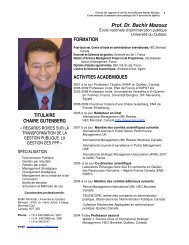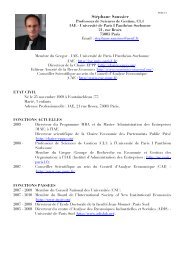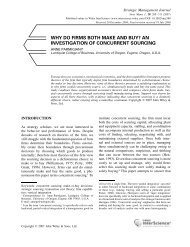Make or Buy Urban Public Transport Services: A Rational Choice?
Make or Buy Urban Public Transport Services: A Rational Choice?
Make or Buy Urban Public Transport Services: A Rational Choice?
Create successful ePaper yourself
Turn your PDF publications into a flip-book with our unique Google optimized e-Paper software.
Economies of scale. In addition to transaction costs considerations, the potential<br />
f<strong>or</strong> production cost reduction may also impact on the make-<strong>or</strong>-buy decision. Contracting<br />
out may indeed be associated with production costs savings through economies<br />
of scale and/<strong>or</strong> competitive eects. F<strong>or</strong> this reason, we introduce the variable Size i ,<br />
which c<strong>or</strong>responds to the length of the netw<strong>or</strong>k in kilometres. Our intuition is the following:<br />
on the one hand, small netw<strong>or</strong>ks may not enjoy sucient economies of scale<br />
to eciently produce the service inhouse. Benets of contracting out may thus be<br />
higher f<strong>or</strong> small netw<strong>or</strong>ks. On the other hand, small netw<strong>or</strong>ks are likely to attract few<br />
private operat<strong>or</strong>s as the potential prots do not justify investing resources in preparing<br />
and submitting bids, which suggests that those cities might be constrained to provide<br />
transp<strong>or</strong>t services directly (Prager 1994). Thus, depending on the relative imp<strong>or</strong>tance<br />
of this two counteracting eects, the impact of the netw<strong>or</strong>k size on the probability to<br />
delegate might be positive <strong>or</strong> negative.<br />
4.2 Non-monetary determinants<br />
4.2.1 Citizens' discontent<br />
Unemployment and inequality.<br />
As shown by Estache, Guasch, Iimi, and Trujillo<br />
(2008), socio-economic circumstances such as inequality and unemployment may play<br />
a role in the decisions taken by public auth<strong>or</strong>ities. This view holds that local governements<br />
may derive political benets from direct provision when they experienced social<br />
tensions. To confront this prediction to data, we use two variables: the unemployment<br />
rate at the city level (Unemployment i ) and the level of inequality as measured by the<br />
interdecile earnings ratio (Inequality i ).<br />
Tax burden.<br />
Consistently with the literature on privatization 8 , we expect cities'<br />
nancial conditions to matter f<strong>or</strong> their contracting decisions. M<strong>or</strong>e specically, we<br />
expect local governments that have tight budgets to be m<strong>or</strong>e likely to outsource to<br />
private operat<strong>or</strong>s to save costs. To test this proposition we use the variable T axes i<br />
which c<strong>or</strong>responds to the average level of taxes dedicated to the nancing of the<br />
transp<strong>or</strong>t sect<strong>or</strong> 9 that city i collects each year, divided by the number of inhabitants.<br />
As indicated in section 2, the subsidies given to the transp<strong>or</strong>t sect<strong>or</strong> come from this<br />
special tax and from the budget of the local auth<strong>or</strong>ities. Theref<strong>or</strong>e an increase in the<br />
level of special taxes allows alleviating the level of funds allocated to the transp<strong>or</strong>t<br />
sect<strong>or</strong> that comes from the city's budget and is associated with a reduction of the<br />
budget constraint. Hence T axes i is expected to impact negatively on the probability<br />
to delegate: the higher the level of special taxes dedicated to the transp<strong>or</strong>t sect<strong>or</strong> paid<br />
8 F<strong>or</strong> a survey see f<strong>or</strong> instance Megginson and Netter (2001).<br />
9 This special tax is called versement transp<strong>or</strong>t and is paid by any local rm with m<strong>or</strong>e than 9<br />
w<strong>or</strong>kers.<br />
11





